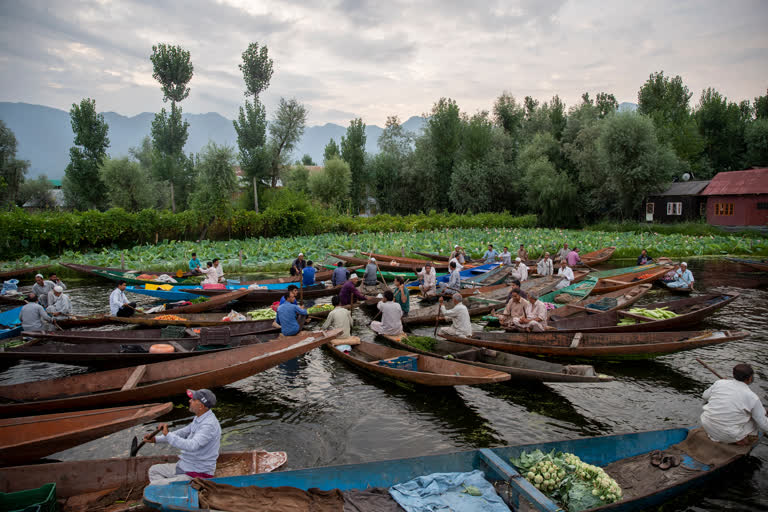Hyderabad: It is one year since the abrogation of Article 370 of the Indian constitution that delegated 'special status' to the former state of Jammu and Kashmir. It was this 'special status' that barred people from the Indian mainland as well as any foreigner from investing in the erstwhile state of Jammu and Kashmir.
As the valley is celebrating its first anniversary of the abrogation of article 370, let's have a look over the changing pattern of law and order situation in the valley.
Terrorists killed 42 people in J&K in one year
While security forces were busy in eliminating terrorists from Jammu and Kashmir, terrorists were targeting the public since the government abrogated article 370 and made Jammu and Kashmir into a union territory.
According to data compiled by the security forces, since August 2019 when the government of India took the big step of abrogating article 370 and making Jammu and Kashmir into a Union Territory, terrorists have killed a total of 42 people. Also, 121 locals were injured in attacks by terrorists. During the next six months after the government decided to abrogate article 370, terrorists targeted labourers, businessman among others.
In October 2019, terrorists killed a total of 11 civilians. This is the highest number of killings by terrorists in J&K from January 2019 till 15 July 2020. In October, terrorists targeted Punjab-based apple traders, Charanjeet Singh and Sanjeev.
The attack in Shopian took place hours after terrorists shot dead a labourer from Chhattisgarh in Pulwama. The labourer, identified as Sethi Kumar Sagar, worked in a local brick kiln. Later, security forces gunned down terrorists who targeted people who were not from Jammu and Kashmir in different encounters.
From January till 15 July 2020, terrorists killed a total of 22 civilians. As per the data, terrorists killed seven civilians in April which is highest in a month this year.
Sharp drop in stone-pelting incidents post abrogation of Article 370
With the government of India abrogating Article 370 from Jammu and Kashmir and turning it into a Union Territory (UT), the incidents of stone-pelting sharply dropped in the UT, thanks to the strict vigilance of the security forces.
According to a data which has been compiled by security forces, security forces recorded 264 stone-pelting incidents, which means, in every three hours there was one incident of stone-pelting recorded in August last year.
The security forces managed to control the situation as in the next 11 months the total number of stone-pelting incidents were just half of the incidents took place in August month only. From September 2019 till July 2020, a total of 133 incidents of stone-pelting took place in a different part of Jammu and Kashmir.
Data also shows that there is a consistently month-wise decline in stone-pelting incidents. After August, in September, October, November and December as per the official data, there were 37, 27, 13, and 11 incidents respectively showing the declining graph of such incidents.
This year as well in January, February, March and April 6, 7, 2 and 3 incidents of stone-pelting have been recorded. Though, in May there was a spike in cases of stone-pelting especially after Riyaz Naikoo Commander of Hizbul Mujahideen encountered by security forces. But in June and July, a total of six cases have been recorded by security forces.
Mainstream leaders under detention
Several mainstream leaders in Jammu and Kashmir, including National Conference (NC) leader Farooq Abdullah, his son Omar Abdullah and People's Democratic Party (PDP) chief Mehbooba Mufti were placed under detention following the abrogation of Article 370. Later, Abdullah and his son Omar were released while Mehbooba's detention continued.
Decline in Kashmiri youths joining terrorist
The number of Kashmiri youths joining terrorist ranks has dropped more than 40 per cent since the revocation of Article 370. The number of youths who joined militancy fell to 67 between January 1 and July 15 this year, compared to 105 a year ago, while terrorist-related incidents declined to 120 from 188 during this period, as per the data.
Infiltration attempts
Infiltration attempts along the Line of Control (LoC), however, remain high as Pakistan-based terrorist groups continue to try to send more militants in the Valley. The lull in militant activities could be partially due to lockdown measures announced by the Union government in March this year due to COVID -19 pandemic. As many as 136 militants were gunned down in the past seven months, higher than 126 a year ago, officials said citing the data.
Hizbul Mujahideen (HM) casualties
On the other hand, 35 security forces personnel have been killed in the line of duty since January 1 compared to 75 in the year-ago period. Hizbul Mujahideen (HM), which is believed to have the largest presence in the region, is said to have suffered the highest casualties of more than 50 militants including its commander Riyaz Naikoo. The militant commander was killed in an encounter with security forces in May this year.
Ceasefire violation
2019 recorded highest ever ceasefire violations by Pakistan in Jammu and Kashmir in the last 16 years. In 2019, amounting to over 3,200 instances or an average of nine such violations daily.
Low-speed internet
On August 4, 2019, a day before the BJP-led government revoked Article 370 of the Constitution and bifurcated Jammu and Kashmir into two Union Territories, it imposed a communication blockade. Gradually, the government restored communication services but internet service has been confined to 2G low-speed connectivity only. Now, that has also been snapped.
Also Read: Abrogation of Article 370 from J&K has long term vision, say experts



